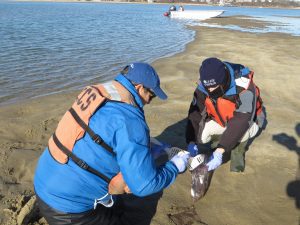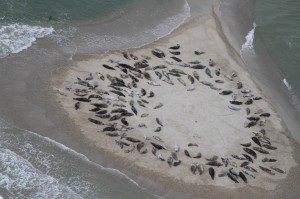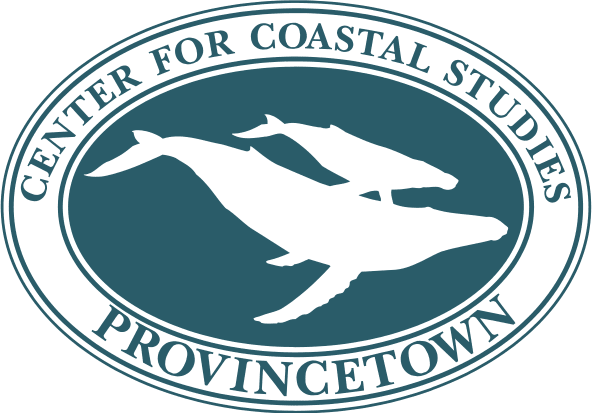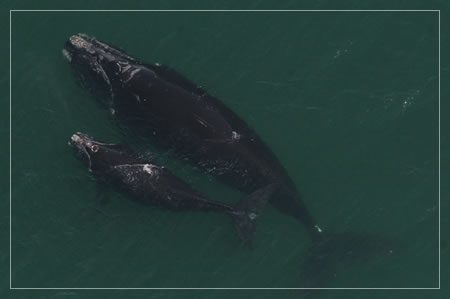
Lisa Sette (left) collecting seal scat.
Investigating prey of harbor and gray seals in Southeastern Massachusetts
Since 2016, CCS Marine Biologist Lisa Sette has been working with collaborators from International Fund for Animal Welfare (IFAW) and Northeast Fisheries Science Center (NEFSC) to collect scat samples from seal haul-outs across Southeastern Massachusetts. One of the key study areas is Pleasant Bay; other locations include Jeremy Point in Cape Cod Bay and Head of the Meadow on the Outer Beach in Truro. The results of the Pleasant Bay study are included in the CCS
Ecosystem Assessment of Pleasant Bay.
Lisa works in conjunction with Louisiana State University (LSU), IFAW, and NEFSC to collect samples from seal haul-outs throughout the year. Back at the lab, each sample is dissected and hard parts such as fish otoliths (ear bones), squid beaks, dermal denticles (modified scales from skate species), shells, bones and teeth are collected. Diet is estimated based on the identification of the source species of those hard parts and the frequency with which they appear in the samples.
During scat collection Sette also gathered samples for LSU graduate student Keith Hernandez. Hernandez is using these to complete prey DNA analysis to identify prey that is often missed by hard part analysis alone. Preliminary results for diet work suggest that the seals take advantage of what is seasonally available.
While sieving scat for hard parts, inorganic micro debris (i.e. plastics) were detected in four samples. Sette worked with CCS’s Christy Hudak to analyze these and
published a note of their findings.
Understanding seal occupancy patterns through aerial surveys

Gray seal haul out in Nantucket Sound. Photo taken by CCS under NOAA Permit No. 17670
Over the past thirty years, gray seals have repopulated southeastern Massachusetts where they once were present prior to seal bounties. This expansion in their range along the Northwest Atlantic has led to a greater number of seals present in our local waters. In 2014 and 2015, the Center for Coastal Studies Seal Studies program, in conjunction with the Northeast Fisheries Science Center (NEFSC), completed monthly aerial seal surveys for southeastern Massachusetts.
The goal of this project was to conduct year-around monthly aerial surveys of major seal haul-out sites in southeastern Massachusetts coastal waters to increase our understanding of seal occupancy patterns in the region. Sette continues work with IFAW to monitor gray and harbor seal haul-outs for entangled animals.
Funding for the Seal Research Program has been provided by Friends of Pleasant Bay, International Fund for Animal Welfare, Island Foundation, The Mandel Family Foundation/Amy Mandel & Katina Rodis Fund, and the University of New Hampshire.
Click here to learn more about the species of seals found on Cape Cod.
NOTE: Please be a responsible seal watcher. Remain 50 yards away from seals at all times. Seals are protected under the Marine Mammal Protection Act. To report violations of the MMPA or seal harassment, contact National Marine Fisheries Enforcement 1-800-853-1964.




